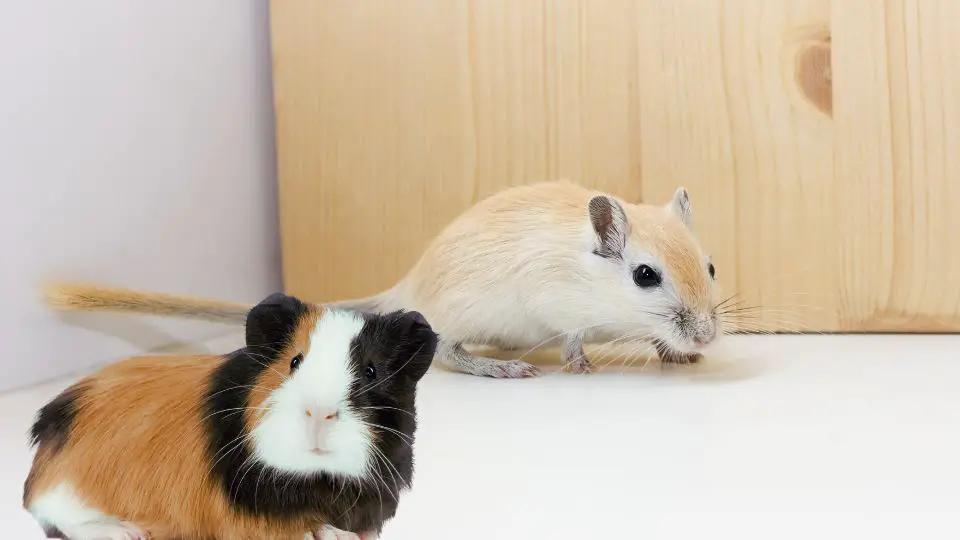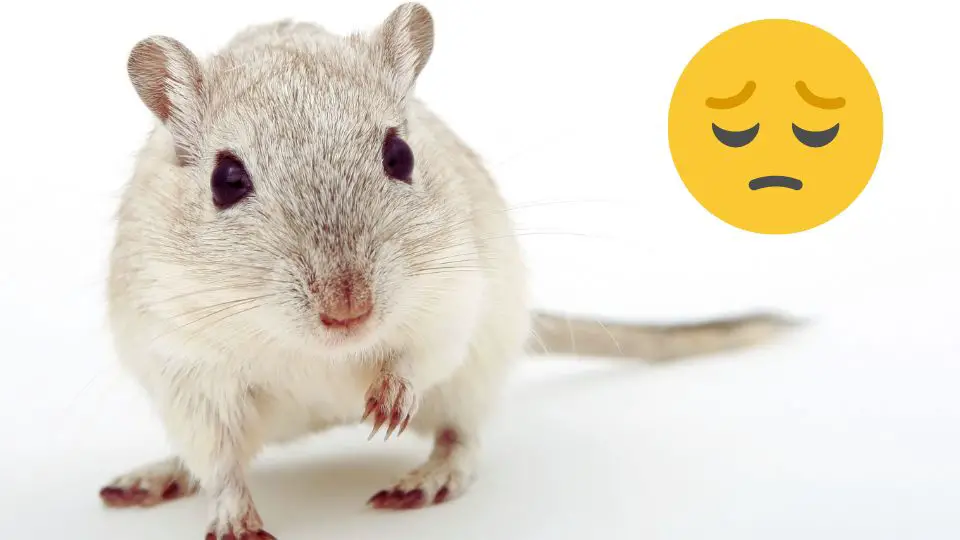When interacting with gerbils, it’s possible to experience a bite from these small rodents. While gerbil bites are generally not a cause for major concern, you should to understand what happens when a gerbil bites you and how to respond.
When a gerbil bites you, it can cause pain, and in some cases, there may be minor bleeding or a small wound. Gerbil bites are typically not dangerous or severe, but it’s important to clean the area with soap and warm water to prevent infection.
In this article, we will explore the potential outcomes of gerbil bites and provide guidance on how to handle such situations.
Can Gerbil Bites Be Dangerous?
Gerbil bites are generally not considered dangerous, but they can cause discomfort and potential complications in some cases. The severity of a gerbil bite depends on various factors, such as the size and strength of the gerbil, as well as the depth and location of the bite. While most gerbil bites result in minor pain, swelling, or bruising, there is a risk of infection due to bacteria present in a gerbil’s mouth.
Are gerbil bites painful?
Gerbil bites can vary in pain depending on the severity of the bite and the individual’s pain tolerance. In general, gerbil bites can cause some degree of discomfort or pain, especially if the bite is deep or breaks the skin. The sharpness of a gerbil’s teeth and the force with which they bite can contribute to the level of pain experienced.
Immediate Response to a Gerbil Bite
While gerbil bites are generally not dangerous, you have to respond appropriately to minimize any potential complications. Here are some immediate steps we recommend taking if you get bitten by a gerbil:
- Stay calm and avoid sudden movements: It’s natural to feel startled or alarmed when bitten, but it is crucial to remain calm. Sudden movements can startle the gerbil further and increase the risk of additional bites or injuries.
- Gently remove your hand: Slowly and gently withdraw your hand from the gerbil’s vicinity to prevent further biting. Avoid pulling or jerking your hand, as this may escalate the situation.
- Assess the bite: Once you have safely removed your hand, assess the severity of the bite. If it is a superficial bite that causes minor pain, swelling, or bruising, you can proceed with self-care at home. However, if the bite is deep, severe, or showing signs of infection, seeking medical attention is recommended.
- Clean the wound: Regardless of the bite’s severity, it is essential to clean the wound promptly. Wash the affected area with mild soap and warm water to remove any bacteria that may have entered the skin.
- Apply an antiseptic: After cleaning the wound, apply an antiseptic solution or an over-the-counter antibiotic ointment to help prevent infection. Follow the product instructions carefully.
- Monitor for signs of infection: Keep an eye on the wound over the next few days for any signs of infection, such as increased pain, redness, swelling, warmth, or discharge. If you notice any concerning symptoms, seek medical attention for further evaluation and treatment.
Assessing the Severity of the Bite
When you experience a gerbil bite, it is essential to assess the severity of the bite to determine the appropriate course of action. Here’s how to assess the severity of the bite:
- Superficial bite: A superficial bite from a gerbil typically causes minimal pain and may leave small indentations or marks on the skin. There is usually no bleeding or only minor bleeding. The area may be slightly swollen or reddened, but it is generally not a cause for major concern.
- Deep bite: A deep bite from a gerbil can be more painful and may result in bleeding or injury to the skin. The bite may penetrate deeper layers of the skin, causing a puncture wound or a larger, more noticeable wound. Deep bites can be more concerning, as they have the potential for infection or may require medical attention.
After assessing the severity of the bite, you should take appropriate steps to address the wound and ensure proper care. For superficial bites, you can typically manage the wound at home with basic first aid. Clean the area with mild soap and warm water, apply an antiseptic solution, and monitor for any signs of infection.
However, if the bite is deep, continues to bleed heavily, or shows signs of infection (such as increasing pain, redness, swelling, or discharge), it is advisable to seek medical attention. In these cases, a healthcare professional can evaluate the wound, provide appropriate treatment, and prescribe any necessary antibiotics.
It is worth noting that gerbil bites are generally not dangerous and do not typically result in serious complications. However, it is crucial to monitor the wound and seek medical attention if needed to ensure proper healing and prevent any potential infections.
Can you get an infection from a gerbil bite?
Yes, it is possible to get an infection from a gerbil bite. While gerbil bites are generally not serious, they can break the skin and introduce bacteria into the wound. Gerbils, like any animal, may carry bacteria in their mouths that can cause infections. It is essential to clean and treat the bite properly to reduce the risk of infection.
First Aid for Gerbil Bites
When it comes to treating a gerbil bite, proper first aid is crucial to promote healing and prevent infection. Here are the steps to take for first aid:
- Wash the affected area: Clean the wound gently but thoroughly with mild soap and warm water. This helps remove any bacteria that may have entered the wound and reduces the risk of infection. Pat the area dry with a clean towel or gauze.
- Apply an antiseptic cream or ointment: After cleaning the wound, apply a thin layer of over-the-counter antiseptic cream or ointment. This helps prevent infection and promotes healing. Be sure to follow the instructions on the product packaging and consult a healthcare professional if needed.
- Use a bandage or dressing: If the bite is deep or continues to bleed, you may consider covering the wound with a sterile bandage or dressing. This provides protection from further irritation and helps keep the area clean. Change the bandage regularly according to your healthcare provider’s instructions.
Do I Need a Tetanus Shot for a Gerbil Bite?
Tetanus is a bacterial infection that can occur through deep puncture wounds or wounds contaminated with certain types of bacteria. While gerbil bites are generally not a high-risk factor for tetanus, it is always advisable to consult with a healthcare professional to assess your immunization status and determine if a tetanus shot is necessary.
Factors such as the severity of the bite, the cleanliness of the wound, and your immunization history play a role in determining the need for a tetanus shot. If you have not received a tetanus shot within the past five to ten years, your healthcare provider may recommend a booster shot as a precautionary measure.
Monitor for Infection
While most gerbil bites heal without complications, it’s crucial to be vigilant and seek medical attention if necessary. In our experience, here are some signs of infection to watch for:
- Increased redness and swelling: If the area around the bite becomes increasingly red, swollen, or warm to the touch, it could indicate an infection. Pay attention to any changes in the appearance of the wound.
- Pus or discharge: The presence of pus or a yellowish discharge from the wound may suggest infection. Keep an eye out for any unusual or foul-smelling fluid coming from the bite.
- Persistent pain: While some pain and discomfort are normal after a bite, severe or worsening pain that doesn’t improve over time could be a sign of infection. Take note if the pain becomes more intense or continues to persist.
- Fever or systemic symptoms: In some cases, an infection may lead to systemic symptoms, such as fever, chills, or body aches. If you develop a fever or experience any other concerning symptoms, you should seek medical attention promptly.
If you notice any of these signs of infection, it’s advisable to consult a healthcare professional.
Reasons for Gerbil Biting
Gerbils may bite for various reasons, and understanding these reasons can help prevent biting incidents and promote a positive relationship with your pet. Some common reasons why gerbils may bite include:
- Fear or Aggression: Gerbils are naturally prey animals, and when they feel threatened or cornered, they may resort to biting as a means of defense. Fear-induced biting is typically a response to perceived danger or when a gerbil feels trapped or unable to escape. Additionally, gerbils can display territorial aggression if they feel their space is being invaded.
- Stress or Discomfort: Gerbils may bite when they are under stress or experiencing discomfort. This can occur if they are in an unfamiliar or stressful environment, or if they are handling a health issue that causes pain or discomfort.
- Lack of Socialization: Gerbils that have not been properly socialized from a young age may exhibit fear or aggression towards human contact. They may interpret handling as a threat rather than a positive interaction.
- Mistaken Identity: Sometimes, gerbils may mistake your hand or fingers for food. This can happen if you have recently handled food, and the gerbil still has the scent on its nose or in its environment. It’s essential to wash your hands thoroughly before handling gerbils to avoid this confusion.
- Hormonal Behavior: Male gerbils, in particular, can exhibit more aggressive behavior during hormonal periods. This behavior is often associated with mating instincts and territorial disputes.
Conclusion
While gerbil bites can be an unexpected and uncomfortable experience, they are generally not a cause for alarm. Most gerbil bites are superficial and can be managed with proper first aid. It’s important to remain calm, assess the severity of the bite, and take appropriate measures to clean and care for the wound.
By understanding the reasons behind gerbil bites and practicing preventive measures, you can minimize the risk of future incidents. Remember, if you have concerns about the bite or if it shows signs of infection, it’s always advisable to seek medical attention.







